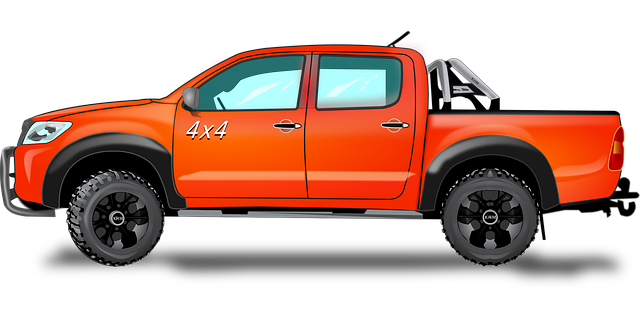Master cylinders are critical components in 4-wheel drive vehicles, amplifying driver input for enhanced braking power across all four wheels. They consist of a cylindrical body with a piston that activates a hydraulic system to distribute force to each wheel's braking mechanism. Regular maintenance at local 4 wheel drive shops is essential to ensure safety and optimal performance, as worn parts can lead to reduced braking power and potential hazards. Master cylinders can be categorized into hydraulic (using fluid pressure) or mechanical (lever system), with both requiring timely service and repair if issues like leaky seals or improper calibration are detected. Local 4 wheel drive shops offer expert advice, tailored services, and high-quality parts for off-road vehicles, fostering a community-oriented approach to automotive maintenance.
Master cylinders are critical components in 4-wheel drive (4WD) systems, providing the necessary hydraulic power to engage and control differential locking mechanisms. This comprehensive guide explores the intricacies of master cylinders, from understanding their basic function and components to the importance of regular maintenance at local 4-wheel drive shops. We also delve into different types, common issues, and best practices for choosing replacement parts, ensuring your 4WD system operates optimally.
- Understanding Master Cylinders: The Basic Function and Components
- Importance of Regular Maintenance in Local 4-Wheel Drive Shops
- Types of Master Cylinders: Hydraulic vs. Mechanical
- Common Issues and Troubleshooting Tips for Master Cylinders
- Choosing the Right Replacement Parts from Local Suppliers
- Expert Advice: Best Practices for Maintaining 4WD Systems with Master Cylinders
Understanding Master Cylinders: The Basic Function and Components

Master cylinders are essential components in vehicles, particularly in local 4-wheel drive systems. Their primary function is to amplify the force exerted by the driver’s brake pedal, ensuring effective braking power across all four wheels. This amplification process is crucial for improving stopping distances and enhancing vehicle stability on rugged terrain.
The basic structure of a master cylinder comprises several key parts. It consists of a cylindrical body housing a piston that moves back and forth upon application of pressure from the brake pedal. This motion activates a hydraulic system, transferring force to each wheel’s individual braking mechanism. The components work in tandem to convert the driver’s input into precise control over the vehicle’s brakes, making off-road adventures safer and more manageable for local 4WD enthusiasts.
Importance of Regular Maintenance in Local 4-Wheel Drive Shops

Regular maintenance is a crucial aspect of keeping your 4-wheel drive vehicle in top condition, especially when relying on local 4 wheel drive shops for service. Master cylinders, responsible for controlling brake functions, require meticulous attention to ensure safety and optimal performance. Over time, these components can wear out, leading to reduced braking power and potential hazards while driving off-road or in challenging terrain.
Local 4-wheel drive shops play a vital role in maintaining these critical systems. Skilled technicians can perform regular checks, replace worn parts, and ensure the master cylinder is functioning at its best. This proactive approach not only extends the life of your vehicle but also enhances your peace of mind when venturing into rugged territories, knowing your brakes are reliable and ready for any adventure.
Types of Master Cylinders: Hydraulic vs. Mechanical

Master cylinders, a vital component in vehicle braking systems, come in two primary types: hydraulic and mechanical. Hydraulic master cylinders rely on fluid pressure to transmit the force from the brake pedal to the brakes, offering precise control and powerful stopping capabilities. This type is commonly found in modern cars and trucks, ensuring efficient braking performance.
On the other hand, mechanical master cylinders use a cable or lever system to connect the brake pedal to the brakes. While they may not provide the same level of precision as hydraulics, mechanical systems are often preferred in off-road vehicles and those with local 4 wheel drive shops, where robust and reliable braking is crucial for navigating challenging terrain.
Common Issues and Troubleshooting Tips for Master Cylinders

Master cylinders, a critical component in vehicle braking systems, can encounter various issues over time, leading to decreased performance and safety hazards. Common problems include leaky seals, worn-out brake fluid, and improper calibration, resulting in soft or unresponsive brakes. If you notice any unusual behavior, such as increased pedal travel or pulsating feelings during braking, it’s essential to address these concerns promptly.
For quick troubleshooting, check for visible signs of damage or corrosion around the master cylinder. Replace any worn-out components and ensure proper flushing and topping up of brake fluid. Local 4 wheel drive shops offer expert advice and services tailored to these specific needs. Regular maintenance and early detection of issues can prevent more significant problems, ensuring a smooth and safe driving experience.
Choosing the Right Replacement Parts from Local Suppliers

When it comes to replacing master cylinders, especially in off-road vehicles or 4x4s, sourcing the right parts from local 4 wheel drive shops is a savvy choice. These specialized stores often carry a wide array of high-quality components tailored for rugged vehicles, ensuring compatibility and performance. Mechanics and enthusiasts alike can benefit from the expertise of these local suppliers, who can provide guidance on choosing the correct master cylinder based on vehicle make, model, and desired capabilities.
Local 4 wheel drive shops offer several advantages. They often have a deep understanding of various makes and models, allowing them to recommend parts that align perfectly with your needs. Additionally, purchasing from these shops supports local businesses, fostering a community-oriented approach to automotive maintenance and modification.
Expert Advice: Best Practices for Maintaining 4WD Systems with Master Cylinders

Maintaining your 4WD system’s master cylinders is crucial for optimal performance and safety, especially if you frequently navigate challenging terrains. Regular inspection and timely repairs are key; neglecting these can lead to catastrophic failures. It’s recommended to consult with experienced local 4 wheel drive shops that specialize in these intricate systems. They can offer expert advice tailored to your vehicle’s make and model.
Consider implementing a preventive maintenance schedule, including periodic fluid changes and thorough checks for leaks or wear. Many local 4WD specialists provide these services, ensuring your master cylinders operate efficiently. Additionally, staying informed about common issues specific to your vehicle can help you catch potential problems early on, saving you from costly repairs down the line.
Master cylinders are essential components in 4WD systems, ensuring smooth and controlled vehicle movement. Regular maintenance, as emphasized by experts in local 4-wheel drive shops, is crucial for preventing common issues like leaks, reduced braking power, and mechanical failures. When replacing parts, choosing the right hydraulic or mechanical master cylinder from reputable suppliers ensures optimal performance and safety. By following best practices advised by professionals, vehicle owners can maintain their 4WD systems effectively, enhancing overall driving experience in diverse terrain.



